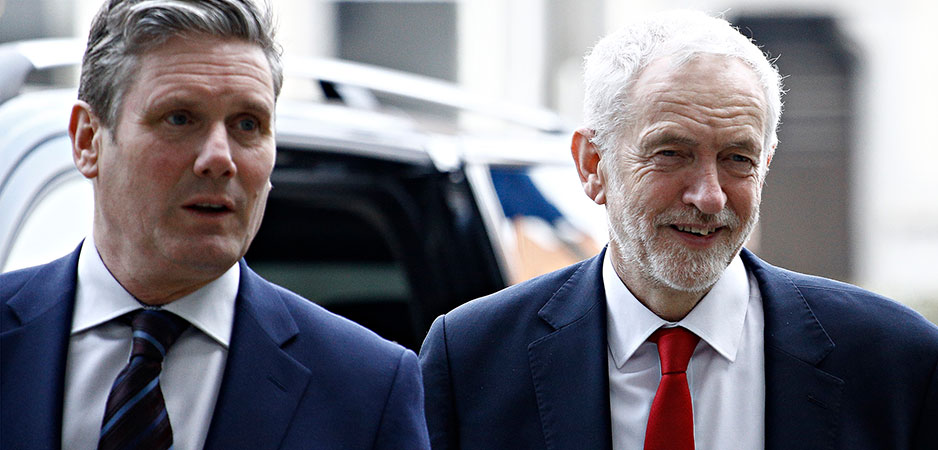Just days after replacing Jeremy Corbyn as leader of the UK’s Labour Party, Sir Keir Starmer finds himself confronted with the task of dealing with an alarming report leaked to the media this week. The 860-page document reveals the depth of factionalism within the party and the very real impact it may have had on Labour’s performance in the two most recent elections. It contains documented evidence that anti-Corbyn officials from the right wing of the party engaged in active sabotage to undermine the electoral chances of Labour.
Labour’s New Safe Pair of Electable Hands
The Independent describes the contents of the report as “a massive cache of leaked WhatsApp messages and emails” that show how “anti-Corbyn officials worked to lose the 2017 general election in the hope that a defeat would force a change of leader.” The report suggests that one of the tactics employed consisted of complicating the ability of the party to deal with the issue of anti-Semitism that had received prominent coverage in the media.
Now that Corbyn has been replaced, some of his supporters are hoping for greater clarity on the nature of a long, simmering conflict inside the Labour Party and accountability for those insiders who may have worked to damage its electoral prospects. Matt Honeycombe-Foster, writing for the PoliticsHome website, reports that a “Labour-backing union has urged Keir Starmer to act against ‘wreckers’ who they say conducted a ‘vicious sabotage campaign’ against Jeremy Corbyn.”
Here is today’s 3D definition:
Wrecker:
A person from the right wing of a left-wing party who defines his or her main responsibility as preventing a popular leader, who takes literally the stated ideals of the party, from achieving electoral success
Contextual Note
This is an embarrassing development for Starmer, not because he may in any way be implicated in the suspect behavior signaled in the report, but because it came out immediately after his election to the leadership position. At a time when he should be actively restructuring the party and appointing new senior party officials, the critics understandably want to know the guilty parties before any new appointments are made.
The Guardian reports that not only some unions but also some parliamentarians have spoken up, identifying problems that merit the same attention as the fight to root out anti-Semitism. “Thirty MPs from Labour’s socialist Campaign Group released a joint statement Monday evening calling for an inquiry into the report, which they said ‘contains revelations of senior officials undermining the 2017 general election campaign and suggests there are cases to answer on bullying, harassment, sexism and racism,’” writes Peter Walker.
The Fire Brigades’ Union termed the alleged behavior a “vicious sabotage campaign.” The iNews website calls it “a fresh civil war within the party,” which may sound a bit alarmist. Len McCluskey, the general secretary of the Unite union, chose to be even more explicit: “These politically crooked officials were prepared to risk dramatic damage to the interests of the British economy and working people just in order to scratch their factional itch.”
Starmer and his deputy, Angela Rayner, issued a joint statement, acknowledging, with traditional British equanimity and understatement, “a number of matters of serious concern.” Taking as objective a position as possible, they cited three areas of investigation: “First, the background and circumstances in which the report was commissioned and the process involved. Second, the contents and wider culture and practices referred to in the report. Third, the circumstances in which the report was put into the public domain.”
In other words, two of the three — the first and third — signal the possibility of simply discrediting the document because of the possible suspect nature of the “process” of its commissioning and the fact that it was leaked. This could mean that, as often happens with whistleblowers, it’s the messenger that may be punished and the message forgotten or hidden from view. But at this early point in his leadership, Starmer can’t simply bury the story, even if he wanted to. He really does need to know who did what and what this all means.
And there appears to be a lot to look at. “The 860-page document claims that ‘an abnormal intensity of factional opposition to the party leader’ had ‘inhibited the proper functioning of the Labour Party bureaucracy’ and contributed to ‘a litany of mistakes’ in dealing with antisemitism, which it admits was a serious problem in the party,” writes Eleni Courea in The Times.
Anti-Semitism ended up being the albatross around Corbyn’s neck that a very vocal cohort of Labour MPs and others shouted from the rooftops. Their message was echoed liberally by the media, including left-leaning outlets such as The Guardian. More than Corbyn’s ambiguous stance on Brexit, anti-Semitism may well have been the weight that finally brought him down. The report makes the following claim: “An extensive internal investigation carried out during the final month of Mr Corbyn’s reign concluded that antisemitism was not properly dealt with because of factional hostility towards the former Labour leader.”
Historical Note
Ever since the Balfour Declaration in 1917, the UK government has had an uncomfortable and often abusive relationship with politics in the Middle East and Israel, in particular. The famous declaration was named after a simple letter that British Foreign Secretary Arthur Balfour addressed to Walter Rothschild, an active Zionist and leading figure in the British Jewish community. In it, Balfour announced Britain’s support for a Jewish homeland in Palestine. Calling the letter a “declaration” gave it a level of diplomatic importance that the circumstances could not justify.
Nevertheless, after the British Mandate of Palestine was put in place in 1920, the British built a strong informal relationship with the Yishuv, the Jewish community of Palestine. The scene was set for what turned into the chaotic unfolding of a project that led to the creation of the nation of Israel three decades later, in the aftermath of World War II and the creation of the United Nations.
At different moments of that span of history, the British encouraged and then blocked the plan for a Jewish state. They finally decided to give up their mandate and pass the problem on to the UN. During the ensuing conflict, Britain settled on a position that was hostile to the Jewish insurgents. For the next two decades, the UK’s policy in the Middle East tended to be pro-Arab. Eventually, the British aligned with the standard Western position of encouraging a two-state solution to the Israeli-Palestinian conflict.
Because of the complexity of this historical relationship, the British public’s image of Israel has been sympathetic but dominantly negative. In a poll taken in October 2015 to the question of whether “Israel‘s standing in the world is being damaged by its current approach to the peace process,” 73% of the Britons polled expressed their agreement. In a 2004 poll, 83% agreed strongly or somewhat that the British government should “take a role in combating anti-Semitism in our country.” Clearly, the British people did not see a direct connection between those two issues. One was geopolitical, the other cultural and internal to their nation.
The anti-Corbynists inside the Labour Party and outside it cleverly used this ambiguity to discredit their own leader. Jeremy Corbyn criticized former Prime Minister Tony Blair’s Middle East policies that notoriously aligned with those of George W. Bush’s White House that focused on two things: oil and the defense of Israel. In 2003, both leaders felt authorized to invade uncooperative countries, starting with Iraq. They uncritically accepted Israel’s apartheid approach to cohabitation with the Palestinians. Elected as leader of the Labour Party in 2015, Corbyn deviated from the policies of both the ruling Conservative Party under David Cameron and the Blairites in Labour by showing concern for the plight of the Palestinians, which clearly upset the Israelis.
Because, as earlier polls consistently showed, anti-Semitism exists at some level among the British population, Corbyn’s enemies made the point of confounding his sympathy for the Palestinian cause with attacks on Jews in Britain that may have been motivated by anti-Israeli or anti-Jewish sentiments, depending on who was doing the hating.
Corbyn’s opponents put together a well-orchestrated campaign to suggest that the Labour leader’s position on the Palestinians was motivated by his anti-Semitism. The proof of that was the undeniable fact that some members of the Labour Party existed who expressed sentiments that correlated with traditional anti-Semitic tropes. But an equally undeniable fact is that anti-Semitism exists probably at similar levels in all the parties. The only detectable difference between the parties is the level of indifference their party leadership shows to the plight of the Palestinian people.
The key takeaway from the report appears not to concern the Labour Party’s hatred of either Jews or Israel, but rather one wing of its hatred for Corbyn. This appears to reflect their nostalgia for the more “moderate” Tony Blair, who showed himself to be clearly immoderate when he aligned his Middle East policy with both the US and Israeli.
This illustrates a phenomenon at work in other respectable left-of-center parties in the West, the most notable case being that of the Democrats in the US. The establishments of both Labour and the Democrats have shown themselves to be particularly resourceful in finding ways to handicap intruders from the traditional left who threaten to overturn the dominant “moderate” (status quo) philosophy of its apparatchiks.
It is highly probable, for example, that had Senator Bernie Sanders achieved a feat similar to Donald Trump’s in 2016, by securing the Democratic nomination in 2020 against the wishes of the establishment, the more enterprising elements of the Democratic Party would have been more effective than the 2016 Republicans in sabotaging Sanders’ candidacy. Of course, they didn’t need to because they effectively maneuvered to prevent Bernie from getting the nomination.
History has provided other examples. In 1968, after Robert Kennedy was assassinated, Eugene McCarthy, an anti-war candidate with no direct ties to Democratic establishment, arrived at the convention with the most delegates gleaned from primary victories in his own name. McCarthy’s left-wing politics were officially hardly distinguishable from Kennedy’s.
Yet instead of rallying behind McCarthy, the Kennedy Democrats — who represented one wing of the establishment — offered the delegates committed to Kennedy to an unknown alternative candidate, George McGovern. The result was the nomination of Vice President Hubert Humphrey, a candidate compromised by Lyndon Johnson’s Vietnam policy. The final result was the election of Richard Nixon.
The moral of the story: The establishments of left-wing parties appear to be more skilled at unleashing “wreckers” than any other group in the political spectrum.
*[In the age of Oscar Wilde and Mark Twain, another American wit, the journalist Ambrose Bierce, produced a series of satirical definitions of commonly used terms, throwing light on their hidden meanings in real discourse. Bierce eventually collected and published them as a book, The Devil’s Dictionary, in 1911. We have shamelessly appropriated his title in the interest of continuing his wholesome pedagogical effort to enlighten generations of readers of the news.]
The views expressed in this article are the author’s own and do not necessarily reflect Fair Observer’s editorial policy.
Support Fair Observer
We rely on your support for our independence, diversity and quality.
For more than 10 years, Fair Observer has been free, fair and independent. No billionaire owns us, no advertisers control us. We are a reader-supported nonprofit. Unlike many other publications, we keep our content free for readers regardless of where they live or whether they can afford to pay. We have no paywalls and no ads.
In the post-truth era of fake news, echo chambers and filter bubbles, we publish a plurality of perspectives from around the world. Anyone can publish with us, but everyone goes through a rigorous editorial process. So, you get fact-checked, well-reasoned content instead of noise.
We publish 2,500+ voices from 90+ countries. We also conduct education and training programs
on subjects ranging from digital media and journalism to writing and critical thinking. This
doesn’t come cheap. Servers, editors, trainers and web developers cost
money.
Please consider supporting us on a regular basis as a recurring donor or a
sustaining member.
Will you support FO’s journalism?
We rely on your support for our independence, diversity and quality.






